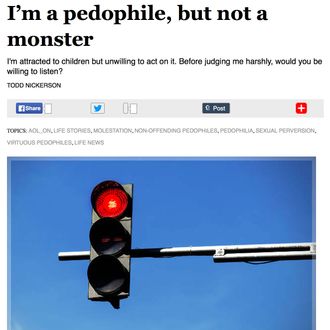
There’s been a lot of talk about pedophilia the last few days. That’s because Milo Yiannopoulos, a right-wing provocateur, lost an important speaking gig and his book deal, and resigned from his day job at Breitbart News, after video of him defending relationships between boys as young as 13 and older men was circulated.
One small but important subplot in all of this centers on Salon, one of the many outlets that covered the controversy. Some critics of the site noted that Salon had taken down an infamous (to them) article about pedophilia, and posited a connection between that act and the Yiannopoulos controversy.
This is half-true. Yes, the article, which had been decried as “pro-pedophile” by some people long before the Yiannopoulos controversy erupted, was unpublished (as was an accompanying video). No, it didn’t have anything to do with Yiannopoulos. Here’s how Jordan Hoffner, Salon Media Group CEO and salon.com acting editor-in-chief, explained what happened in a statement sent to Science of Us by a spokesperson:
Prior to my joining Salon Media Group, the original Nickerson column was published in September 2015. The column was taken down in January 2017 as we rolled out new editorial policies. All stories on Salon.com, including our ‘Life Stories’ columns, now follow a new vetting process and standards for contributions before any are published. We’re dedicated to covering breaking cultural news stories, and the coverage of Milo Yiannopoulos falls under our current editorial standards.
This doesn’t really explain why the column was taken down, so I sent a follow-up email asking which standards exactly were breached, but the spokesperson said Hoffner wouldn’t have any further comment.
Now, as Hoffner and Salon surely know, things live forever on the internet, so you can still read the original Nickerson article here. And doing so makes it clear that Salon took a silly, overly risk-averse approach here, likely caving to a chorus of voices who willfully misunderstood the article. That’s unfortunate, since this was a brave and important article to publish — one the site should be proud of rather than try, futilely, to toss down the memory-hole.
“I’m a pedophile, but not a monster” is an autobiographical account of how Nickerson came to realize he was attracted to children, how this has affected him, and how he controls his urges. He thinks his pedophilia might be connected to the fact that he was molested by a German visitor his parents were hosting when he was 7 years old, but acknowledges he can’t prove this.
The first part of Nickerson’s essay simply explains how difficult his life has been as a result of his attractions. These days, he explains, he is “existing on food stamps and the couple hundred dollars I manage to scrape together every month, sometimes augmented with financial help from my parents if the bills get too high.” His feelings of being cut off from normal society have led him to some dangerous places: Over the years, Nickerson writes, he has spent a lot of time in shady online forums for pedophiles where some members would openly advocate for sexual contact with children. But things turned around for him, he explains, when he discovered Virtuous Pedophiles, an online support organization for pedophiles who want to make sure they never hurt anyone. Its founders, Ethan Edwards and Nick Devin, wanted to create a space for pedophiles to talk about their struggles with their urges, but where there would be a strict no-tolerance policy for any pro-child-sex advocacy.
Nickerson writes:
I really can’t praise this organization enough. It’s been a lifesaver for me. I still get depressed and anxious sometimes, but I’m improving. I feel better about myself and a little more hopeful about my future these days. I have other pedophiles in my life that I’m actually proud to call friends, people I would trust my children with if I had any, knowing they’d be safe there. Many, like Ethan, have raised families of their own, or are still doing so. A large number of them are quite young. Despite the prevailing stereotype of the dirty old man, the average age of posters at VP hovers around mid-twenties. I’m so glad that younger folks are flocking to Virtuous Pedophiles, where they can get the coaching and support that was not available to us older pedos at their age. It’ll make all the difference as they settle into themselves and learn to accept who they are.
VirPed itself has become the go-to place for support for non-offending pedophiles and has been mentioned and endorsed everywhere from NPR, Salon and the Atlantic to the New York Times and Toronto Star. As its popularity increases, so too does its effectiveness. There are still holdouts, people who believe that pedophilic feelings should be crammed down into the most subterranean recesses of ourselves, never to be discussed in the open, but these folks are going the way of the dodo bird. Anyway, we’ve tried that. Take it from someone who has firsthand experience: it not only doesn’t work, it tends to make things far worse. Please repeat this mantra to yourself: a repressed, unhappy pedophile is a pedophile at risk.
That last sentence is really important, and it tracks with what criminologists and psychologists who study sex offenders have consistently told me: When it comes to pedophiles, policies geared at ostracization and humiliation for their own sake don’t make anyone safer. What’s needed are evidence-based approaches.
Nickerson concludes his article with a plea for a partnership between “virtuous” pedophiles and the rest of society — albeit ones he acknowledges is likely to be uneasy:
For better or worse—mostly worse—we have this sexuality, and unlike with most sexualities, there is no ethical way we can fully actualize our sexual longings. Our desires and feelings, if we are to remain upright, are doomed from the outset. Indeed, whereas the majority of crimes can be bounced back from, society doesn’t extend a mulligan to molesters. I understand why, but that doesn’t make the burden any lighter to bear, particularly for those of us who have minimal or no attraction to adults. And for the pedos who are lucky enough to be able to form working relationships with adults, there are a new set of concerns: What if we have children? Will I be a threat to them? Can I ever share this fact with my spouse? Can I ever love and want her as much as I do a child?
So, please, be understanding and supportive. It’s really all we ask of you. Treat us like people with a massive handicap we must overcome, not as a monster. If we are going to make it in the world without offending, we need your help. Listening to me was a start.
No reasonable reader could construe this as pro-pedophilia. Nickerson is explicitly saying his condition has hampered his life immensely and that he is simply hoping to scratch out a decent existence without hurting anybody. That’s the entire point of the article — nowhere does he defend sexual contact between adults and minors. Why, then, was his article deleted? It sounds like Salon won’t ever provide an explanation.
This sort of thing matters. In an email to Science of Us, James Cantor, a University of Toronto psychologist who is one of the leading researchers in the world on this subject, said he was “very surprised” to see the article had been removed, and laid out the stakes. “Salon was one of the very first media outlets to cover the stories of ‘Virtuous Pedophiles,’” he explained. “Because pedophilia appears in the media only in association with crime, the public are essentially unaware these people exist. Not only do they exist, but they may indeed hold the key for teaching other people how to live with their sexual attractions without posing harm to others. Child sexual abuse happens where open communication is blocked, and I am disappointed to watch it happen.”
In a better world, pedophilia wouldn’t exist; no one would have these urges. Unfortunately, it does exist — it pops up everywhere and no one is quite sure why — and what mature, thinking adults do in the face of a problem is to talk about it openly and try to mitigate its damage, not sweep it under the rug or drown it in over-the-top moralizing. Unfortunately, by deleting this article, originally with no explanation, and then with a bland, corporate-PR one, Salon is sending the signal that it did something wrong by publishing it in the first place. It’s ceding ground to the many people who have endlessly and thoughtlessly parroted the pro-pedophile charge. Society should want articles like this published. Articles like this, in the long run, help keep children safe from pedophiles.




